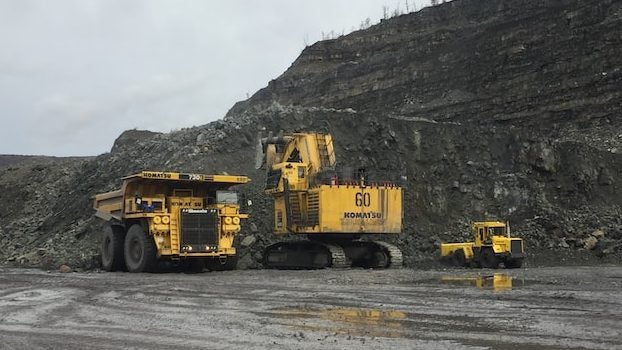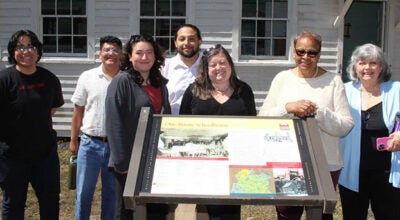Buckingham County can avoid gold mining, officials say
Published 8:20 pm Friday, September 30, 2022
|
Getting your Trinity Audio player ready...
|
DILLWYN – There are ways the Buckingham County Board of Supervisors can ban gold mining in their area. Joe Lerch outlined how that was possible Monday, Sept. 26, during the latest meeting of the state’s gold mining workgroup.
The group, set up to study if Virginia needs to ban or restrict gold mining in the state, has brought in experts over the last few months to provide information on the subject. That’s where Lerch comes in. He serves as director of local government policy for the Virginia Association of Counties, bringing a bachelor’s degree in geology and a master’s in urban and regional planning to the task.
The workgroup brought him in to help answer questions and clear up confusion, as members were under the impression that Buckingham couldn’t legally ban the practice. That was the cited reason by Buckingham County supervisors as to why they put off any decision on a gold mining ordinance back in August. They were concerned about being sued by companies who purchased land and wanted to start mining.
Lerch said that wasn’t entirely accurate, as there’s nothing in state law saying a county or town can’t issue a type of ban. It all depends on what the local zoning ordinance says.
“In (the Buckingham) zoning ordinance, you can say this is not allowed activity,” Lerch told the group. “Or you could say it is allowed in (a certain) type of district, like an industrial district, with a special use permit. If you want to say we don’t even want to consider it, that could be in your ordinance too.”
The closest the General Assembly has come to saying “you can’t ban mining”, Lerch added, was in 1984. At that point, legislation was filed that would have prevented cities and counties from banning the activity through their ordinances. However, that bill was rewritten, turned into something completely different by the time it was approved.
“That bill ended up becoming the (uranium mining) moratorium the state set up,” Lerch said. “I think that’s where some of the confusion is.”
Gold mining vs. uranium mining
Another part of the confusion comes from how the courts handled uranium mining. For almost 40 years, Virginia has had a moratorium on the practice. In 2020, Virginia Uranium filed a lawsuit, arguing the moratorium was unconstitutional, as it prevented the company from doing what it wanted with private land.
In the City of Norton Circuit Court, Judge Chadwick Dotson upheld the moratorium, saying that while the moratorium does take some property rights away from owners, the state had a right to do so because uranium mining is “an inherently dangerous activity with potentially dangerous interdict effects.”
Buckingham supervisors were afraid of something similar happening here, being taken to court if they banned the practice of gold mining. Instead, during their Aug. 8 meeting, they opted to wait until the state workgroup finishes its task and presents a report in December. Once that happens, and supervisors see what the General Assembly does with that report, they plan to revisit the issue.
But in going over this with the workgroup, Lerch pointed out gold mining doesn’t have the same regulations as uranium. In fact, there are 427 active mineral mines across Virginia, according to the U.S. Geological Survey, including some focused on gold.
Some are just prospect mines, where a company isn’t sure what they’ll find. Others are occurrence mines, where you’ll only find a small bit of gold or iron in one isolated drill hole. And then there are the industrialized mines, the big operations. It’s up to local governments to design and enforce ordinances in each case. That means managing the mine’s impact on local traffic, mitigating noise levels, deciding hours of operation and land use zoning.
Lerch said he couldn’t promise a company wouldn’t try to sue if a county or city banned or put restrictions on mining. But he wasn’t sure anything would come of it.
“If a locality adopts an ordinance and it complies with state law under its authority, I think it would be pretty sound,” Lerch told the workgroup. “If somebody wants to challenge that in court, I think they could, but where that goes, I don’t know.”
Is there gold in Buckingham County?
So why is this debate happening in Buckingham County? It stems from a situation that started more than two years ago. In April 2019, the Canadian prospecting company Aston Bay Holdings announced they were beginning to search for gold in Buckingham.
To be clear, Aston Bay isn’t a mining company. It’s a prospecting company. That means they search for gold, silver or other minerals, identify and purchase a location, then sell that information (and property) to the highest bidder. They can do this because under Virginia law, prospecting doesn’t require a state permit if you’re searching for anything other than uranium.
In statements given in March 2019 and July 2020, company officials declared their drilling confirmed a “a high-grade, at-surface gold vein system at Buckingham, as well as an adjacent wider zone of lower-grade disseminated gold mineralization.” In other words, they found enough to keep going. At the beginning of 2020, the company secured the right to prospect on 4,953 acres of land in Buckingham County.
In an interview earlier this month with The Herald, Aston Bay CEO Thomas Ullrich said the gold vein they’ve found is almost vertical, approximately one to two meters wide, 200 meters in length and extends into the subsurface to about 100 meters deep.
“This is contained in a very small footprint, on the order of a few acres,” Ullrich said. “It is possible that the vein extends deeper and farther laterally along (the) strike.”
But they still don’t know how far it stretches, as Ullrich added the company was “still in the early stages of exploration.”
As for a timeline on when work might be finished, first it has to be restarted. The company hasn’t done any work in Buckingham since early 2020.
“We have conducted only preliminary exploratory drilling on the local landowners’ properties at Buckingham, and none for the past two years,” Ullrich said. “We have several quality potential projects, but a limited amount of funds. Over the last year and a half, we have been investing in the landowners in another county. We look forward to investing in Buckingham again.”
What happens next in Buckingham County?
Monday’s meeting, held at 9 a.m. in Dillwyn, was the latest in a series for the workgroup. Created by the General Assembly in 2021, the group consists of two parts.
One of those is a technical committee, evaluating the scientific aspects of gold mining. That group is led by officials from the National Academies of Sciences, Engineering and Medicine (NASEM). The other group, which is the one that met Monday in Buckingham, includes representatives from Virginia Energy, the Department of Environmental Quality, the Virginia Department of Health, the Council on Environmental Justice, the Monacan Indian Nation and local citizen groups.
The idea is to evaluate the impacts of gold mining on the area. The work group looks into the effects gold mining will have on the environment, including public health in general and the air and water quality.
Are existing regulations strong enough to protect air and water quality? Are there areas where mining needs to be banned? To answer those and other questions, experts in mining, hydrology, toxicology and other fields are being brought in. Also representatives of potentially affected communities in localities with significant deposits of gold are also included.
There’s at least one more of these public meetings scheduled. The next one will take place on October 18 in Buckingham. As we get details on time and location, we’ll include them here in the paper and on our website.
Once those public hearings conclude, the two parts of the workgroup will come together to deliver that report we previously mentioned. That will be discussed in the next General Assembly session, which begins in January 2023.






